
Plankton are the diverse collection of organisms found in water that are unable to propel themselves against a current. The individual organisms constituting plankton are called plankters. In the ocean, they provide a crucial source of food to many small and large aquatic organisms, such as bivalves, fish and whales.

Zooplankton are heterotrophic plankton. Plankton are organisms drifting in oceans, seas, and bodies of fresh water. The word zooplankton is derived from the Greek zoon (ζῴον), meaning "animal", and planktos (πλαγκτός), meaning "wanderer" or "drifter". Individual zooplankton are usually microscopic, but some are larger and visible to the naked eye.

Copepods are a group of small crustaceans found in nearly every freshwater and saltwater habitat. Some species are planktonic, some are benthic, a number of species have parasitic phases, and some continental species may live in limnoterrestrial habitats and other wet terrestrial places, such as swamps, under leaf fall in wet forests, bogs, springs, ephemeral ponds, and puddles, damp moss, or water-filled recesses (phytotelmata) of plants such as bromeliads and pitcher plants. Many live underground in marine and freshwater caves, sinkholes, or stream beds. Copepods are sometimes used as biodiversity indicators.
In underwater diving, open water is unrestricted water such as a sea, lake or flooded quarries. It is the opposite of confined water (diving) where diver training takes place. Open water also means the diver has direct vertical access to the surface of the water in contact with the Earth's atmosphere. Open water diving implies that if a problem arises, the diver can directly ascend vertically to the atmosphere to breathe air. Penetration diving—involving entering caves or wrecks, or diving under ice—is therefore not "open water diving". In some contexts the lack of a decompression obligation is considered a necessary condition for classification of a dive as an open water dive, but this does not affect the classification of the venue as open water.
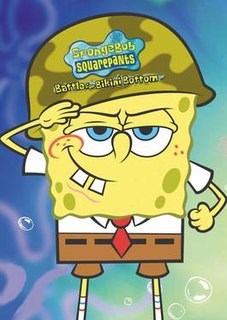
SpongeBob SquarePants: Battle for Bikini Bottom is a platform video game based on the Nickelodeon animated series SpongeBob SquarePants, developed by Heavy Iron Studios and published by THQ for the PlayStation 2, Xbox, and GameCube consoles. Separate versions, developed by AWE Games and Vicarious Visions respectively, were released for Microsoft Windows and Game Boy Advance. While the versions released for consoles were 3D platform games, the Microsoft Windows version of the game is a mini-game compilation, and the Game Boy Advance received a 2D platformer version.

Sir Alister Clavering Hardy was an English marine biologist, an expert on marine ecosystems spanning organisms from zooplankton to whales. He had the artistic skill to illustrate his books with his own drawings, maps, diagrams, and paintings.
Chum bucket or chumbucket can mean:

SpongeBob SquarePants: Creature from the Krusty Krab is an action-adventure platform game released for Microsoft Windows, Game Boy Advance, GameCube, PlayStation 2, Nintendo DS and Wii by THQ. An Xbox version may have been planned at some point, but was cancelled for unknown reasons. The PS2, GameCube, and Wii versions are all ports of the same game developed by Blitz Games, while the Game Boy Advance, Nintendo DS, and PC versions were separate games developed by WayForward Technologies and AWE Games respectively. It is based on the Nickelodeon animated sitcom SpongeBob SquarePants, and stars the title character, his best friend Patrick Star, and their enemy Plankton as they journey to nine different worlds, supposedly, inside the dreams of the characters. The Wii version was a North American launch title. It is also the first SpongeBob game released in Japan, but was released under the title SpongeBob, to mark it as the first video game in the SpongeBob series to have a Japanese release. The PC version of the game is titled SpongeBob SquarePants: Nighty Nightmare.

Biotherm is a French skin care company owned by L'Oréal under the Luxury Products division. Biotherm was acquired by L'Oréal in 1970.
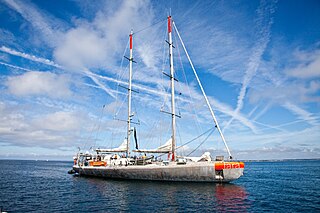
The Tara expedition is an oceanic research expedition.
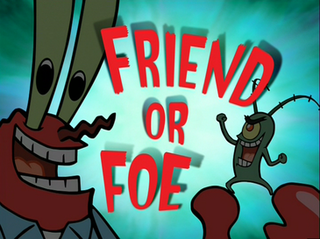
"Friend or Foe" is the first episode of the fifth season of the American animated television series SpongeBob SquarePants, and the 81st episode overall. It was written by Casey Alexander, Zeus Cervas, Mike Mitchell, Steven Banks, and Tim Hill, and the animation was directed by supervising director Alan Smart and Tom Yasumi; Alexander, Cervas and Mitchell also functioned as storyboard directors. The episode originally aired on Nickelodeon in the United States on April 13, 2007.

In aquatic biology, the paradox of the plankton describes the situation in which a limited range of resources supports an unexpectedly wide range of plankton species, apparently flouting the competitive exclusion principle which holds that when two species compete for the same resource, one will be driven to extinction.

The SCARSouthern Ocean Continuous Plankton Recorder (SO-CPR) Survey was established in 1991 by the Australian Antarctic Division,of Environment, Water Heritage and the Arts, to map the spatial-temporal patterns of zooplankton and then to use the sensitivity of plankton to environmental change as early warning indicators of the health of the Southern Ocean. It also serves as reference for other Southern Ocean and Antarctic monitoring programs.
A mixotroph is an organism that can use a mix of different sources of energy and carbon, instead of having a single trophic mode on the continuum from complete autotrophy at one end to heterotrophy at the other. It is estimated that mixotrophs comprise more than half of all microscopic plankton. There are two types of eukaryotic mixotrophs: those with their own chloroplasts, and those with endosymbionts—and those that acquire them through kleptoplasty or by enslaving the entire phototrophic cell.

Ichthyoplankton are the eggs and larvae of fish. They are mostly found in the sunlit zone of the water column, less than 200 metres deep, which is sometimes called the epipelagic or photic zone. Ichthyoplankton are planktonic, meaning they cannot swim effectively under their own power, but must drift with the ocean currents. Fish eggs cannot swim at all, and are unambiguously planktonic. Early stage larvae swim poorly, but later stage larvae swim better and cease to be planktonic as they grow into juveniles. Fish larvae are part of the zooplankton that eat smaller plankton, while fish eggs carry their own food supply. Both eggs and larvae are themselves eaten by larger animals.
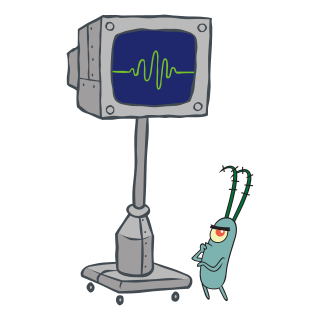
Sheldon J. Plankton and Karen Plankton are fictional characters and the main antagonists in the Nickelodeon animated television series SpongeBob SquarePants. They are respectively voiced by Mr. Lawrence and Jill Talley. Their first appearance was in the episode "Plankton!" that premiered on July 31, 1999. They were created and designed by marine biologist and animator Stephen Hillenburg, the creator of the series. Hillenburg named Karen after his wife, Karen Umland.
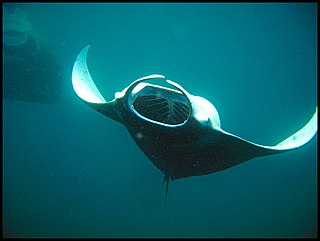
A planktivore is an aquatic organism that feeds on planktonic food, including zooplankton and phytoplankton. Planktivorous organisms encompass a range of some of the planet's smallest to largest multicellular animals in both the present day and in the past billion years; basking sharks and copepods are just two examples of giant and microscopic organisms that feed upon plankton. Planktivory can be an important mechanism of top-down control that contributes to trophic cascades in aquatic and marine systems. There is a tremendous diversity of feeding strategies and behaviors that planktivores utilize to capture prey. Some planktivores utilize tides and currents to migrate between estuaries and coastal waters; other aquatic planktivores reside in lakes or reservoirs where diverse assemblages of plankton are present, or migrate vertically in the water column searching for prey. Planktivore populations can impact the abundance and community composition of planktonic species through their predation pressure, and planktivore migrations facilitate nutrient transport between benthic and pelagic habitats.
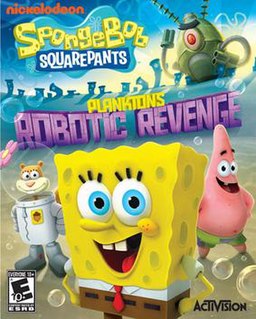
SpongeBob SquarePants: Plankton's Robotic Revenge is an action-adventure platform video game developed by Behaviour Interactive and published by Activision, based on the SpongeBob SquarePants series by Nickelodeon; in the game, players control SpongeBob, Patrick, Squidward, Mr. Krabs and Sandy as they attempt to stop Plankton from stealing the Krabby Patty formula; it was released on October 11, 2013 in North America for the PlayStation 3, Xbox 360, Wii, Wii U, Nintendo DS and Nintendo 3DS.

SpongeBob HeroPants is a 2015 action-adventure platform video game based on the animated movie The SpongeBob Movie: Sponge Out of Water. It was released on February 3, 2015 in North America and on March 26, 2015 in Europe for the Nintendo 3DS, PlayStation Vita, and Xbox 360. The game was developed by Behaviour Santiago and published by Activision.

A Krabby Patty is a veggie burger sold by the fictional restaurant the Krusty Krab in the animated television series SpongeBob SquarePants. The series' creator, Stephen Hillenburg, expressly stated that the patties do not contain any meat. Created by the restaurant's founder Eugene Krabs and his archenemy Plankton, it is what the main character SpongeBob cooks throughout his job as a fry cook, as well as the restaurant's trademark food and most famous burger in Bikini Bottom. A prominent storyline throughout the series is Krabs' nemesis Plankton trying to steal the Krabby Patty secret formula. This running gag was given a backstory in the special "Friend or Foe", where it is revealed that Krabs and Plankton created the Krabby Patty to compete with the health-violating restaurant Stinky Burgers.
















